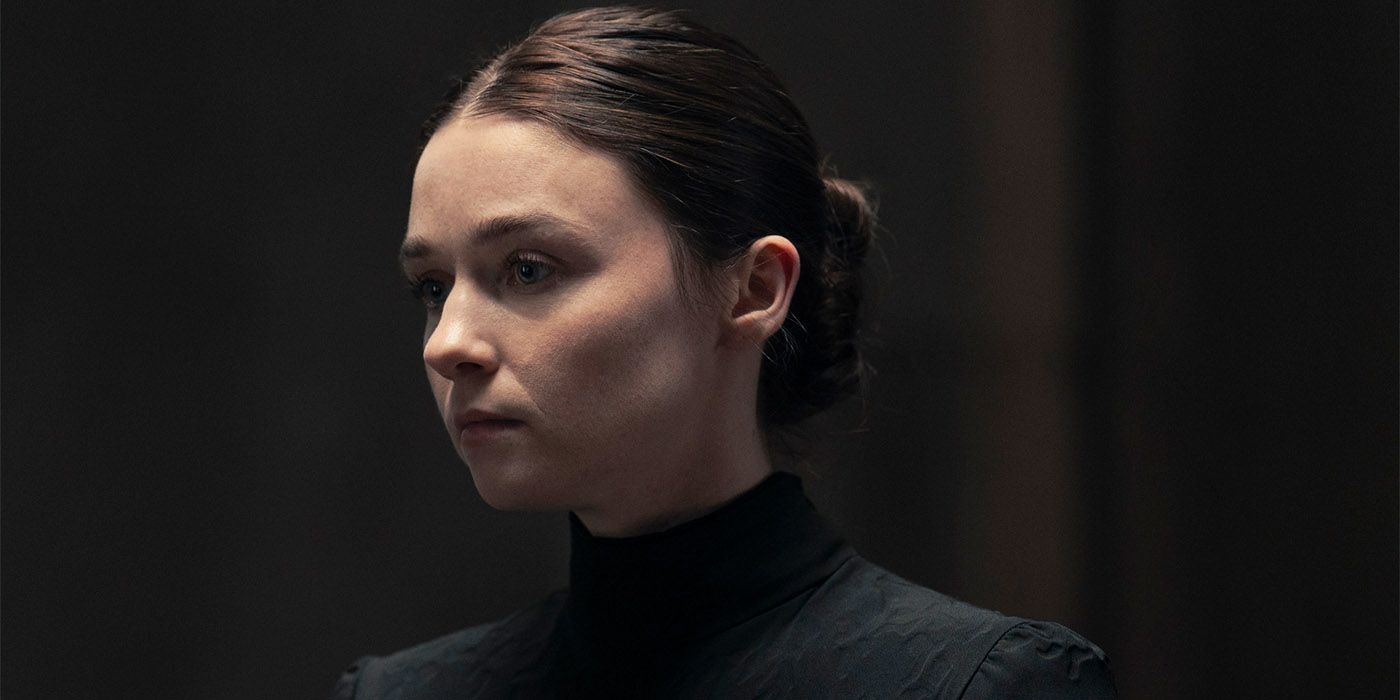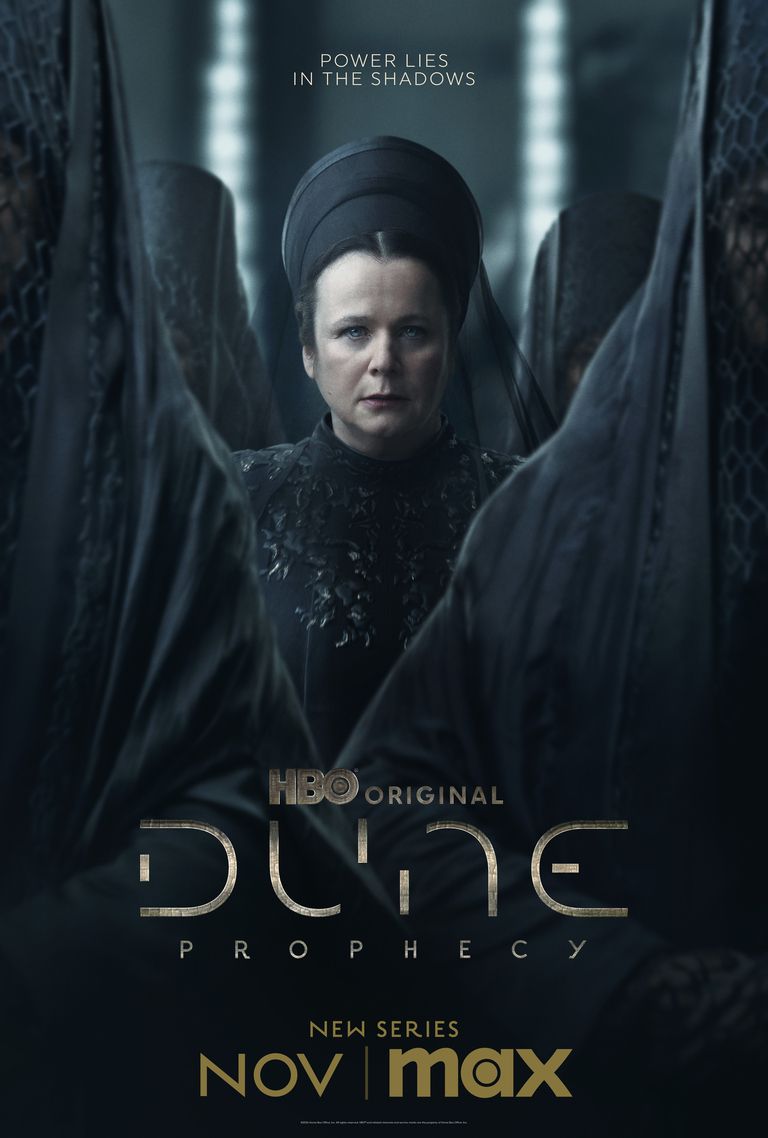[ad_1]
Editor’s note: The below contains spoilers for Dune: Prophecy Episode 3.
Several of the most overtly evil villains in the Dune universe are members of House Harkonnen, but the franchise also frequently subverts expectations in regard to the monstrous family. During one of the most intense points in the generations-long feud between Houses Harkonnen and Atreides, Frank Herbert’s original Dune novel reveals that its protagonist, Paul Atreides, and his mother, Jessica, are themselves part-Harkonnen, with Jessica being the biological daughter of the enemy house’s patriarch, Baron Vladimir Harkonnen. The prequel television series Dune: Prophecy further upends the assumed dynamic of Atreides being morally good and Harkonnens being evil by featuring a pair of Harkonnen sisters, Valya (Emily Watson), and Tula (Olivia Williams), as its protagonists.
‘Dune: Prophecy’ Makes House Harkonnen Both Sympathetic and Ruthless
In Dune: Prophecy, the sisters’ backstory depicts House Harkonnen in a sympathetic position, but the girls’ actions, both as adolescents and later in life as leaders of the influential galactic organization known as the Sisterhood, highlight how even they possess the petty desires for revenge and power that corrupt many of their descendants. Episode 3 of Dune: Prophecy contains lengthy flashback sequences depicting Valya (Jessica Barden) and Tula’s (Emma Canning) adolescent years, during which House Harkonnen lives in exile on the planet Lankiveil. Valya asserts that this is because their great-grandfather was falsely accused of a war crime by Vorian Atreides. After her older brother, Griffin (Earl Cave), promises to use his new position with the Landsraad to clear their family name, he is found dead, with Valya believing that Vorian murdered him, although it is not shown whether this is actually true.
Some time later, while Valya trains to join the Sisterhood, Tula enters into a relationship with a young man from House Atreides, Orry (Milo Callaghan), while using a false last name. Orry eventually takes Tula to meet his family during an elaborate hunting trip and even proposes marriage. Tula, who seems to have developed genuine feelings for Orry, confesses her true identity, but Orry is prepared to accept her and continue their relationship despite this, criticizing the feud between their houses as an unreasonable construction. However, while Tula says that she “[regrets] that things are the way they are,” she also asserts, “Some things can’t be changed, Orry. My brother… Griffin will still be dead, and it will still be an Atreides who killed him.” This is also the moment when Orry discovers that Tula has killed the rest of the Atreides hunting party. She then kills Orry himself, though this visibly upsets her, and she allows a younger member of the party, Albert (Archie Barnes), to flee. Although several of the Harkonnens are horrified by what Tula has done, blaming it on Valya’s influence, the latter is proud of her sister and ultimately recruits her for the Sisterhood.

Related
‘Dune: Prophecy’ Reveals a Key Origin for a Surprising Part of Bene Gesserit Lore
Words have always had power.
The Harkonnen Appetite for Revenge Lasts for Generations Until the Events of ‘Dune’
The sisters initially seem quite removed from the grotesque, villainous Harkonnens shown in Denis Villeneuve’s Dune films, but their inability to abandon grudges or the pursuit of increased power and authority connects them to even these outwardly disparate descendants. The films also provide similar examples of how noble, or at least sympathetic, Harkonnens can be corrupted by these pursuits. In Villeneuve’s Dune: Part Two, Paul (Timothée Chalamet) joins the Fremen of planet Arrakis in waging war against the Harkonnens and the royal family of House Corrino, in retaliation for their conspiracy plot to assassinate Paul’s father, Duke Leto Atreides (Oscar Isaac), and the rest of his family, despite Jessica (Rebecca Ferguson) noting that Leto didn’t believe in revenge.
Despite his desire for vengeance, Paul initially hesitates to accept the mantle of Lisan al Gaib, the prophesied savior many of the Fremen believe him to be, as his prescient ability to see the future warns him that doing so will turn the Fremen into a fanatical army that wages a genocidal war across the universe. However, following a particularly horrific strike from the Harkonnens against a Fremen community, as well as the discovery of his and Jessica’s Harkonnen ancestry, Paul fully commits to killing the Baron (Stellan Skarsgård) and taking Emperor Shaddam Corrino IV’s (Christopher Walken) throne, despite knowing that this will ignite a version of the larger war. Paul explains this embrace of ruthless tactics to his mother by simply saying, “We’re Harkonnens. So this is how we’ll survive. By being Harkonnens.”
Although Jessica ultimately supports Paul’s endeavors, her initial reluctance to pursue the path of vengeance in Villeneuve’s film, and Valya and Tula’s elders’ responses to Tula’s actions in Dune: Prophecy, emphasize that Harkonnens are not completely devoid of morality. However, the actions of characters like Valya, Tula, and Paul, not to mention those of more obviously corrupt figures like the Baron, show that, however unfair the origin of House Harkonnen’s reputation may be, many of its members inevitably earn it, even if they only do so with understandable motivations.
New episodes of Dune: Prophecy premiere Sundays at 9 p.m. ET on HBO and Max.
[ad_2]
Source link






